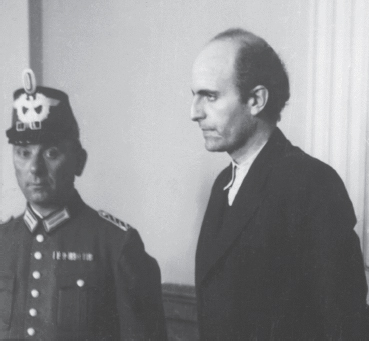
Adam von Trott before the Volksgerichtshof (‘People’s Court’), 15 August 1944
I KNEW ADAM VON TROTT best during the early 1930s, when he was a Rhodes Scholar, and I was a graduate student and then at All Souls. We met at lunch in Balliol College, at the end of which he suggested that we might go for a walk that afternoon. We became friends almost at once. He had exceptional charm, great distinction of mind and manner, was extremely handsome, had both wit and humour, and was at all times a most delightful companion. I was completely captivated. He had a far wider view of history and culture than most of my Oxford friends: his conversation was interspersed with references to Schiller, Hegel, Kleist, Goethe – not names often mentioned in those days by students of the school of PPE, and he aroused in me an interest in these thinkers which has stayed with me ever since. Oddly enough he did not, so far as I can remember, talk to me about contemporary politics, either then or, with one or two exceptions, later, as he evidently did to others of his friends. In 1931–3 he seemed to me gay, carefree and invariably exhilarating. He did not even speak to me about Hitler’s rise to power. If I brought up the subject, he tended to wander into fascinating, somewhat general, historical disquisitions.
He went to Germany, and returned to Oxford, some time in 1933. The philosopher R. G. Collingwood gave a party to welcome him. On this occasion, when we all crowded round him and asked him what was going on in Germany, he said ‘My country is very sick’, and not much more (to the best of my recollection). I received the impression that he saw a vast transformation going on in Europe, a kind of fateful historic mutation, to which the ordinary categories did not apply – terrifying, sinister, but unlikely to be intelligible to academics like myself, encapsulated, so it may have seemed to him, in the excessively self-centred, cosy Oxford world.

Adam von Trott before the Volksgerichtshof (‘People’s Court’), 15 August 1944
I did not see him often after that. I remember one incident. After he returned to Germany for good he wrote a letter to the Manchester Guardian which somewhat upset me. It was in response to a report by the Guardian’s correspondent in Germany, F. A. Voigt, who said that justice in German law courts was weighted against Jews. Adam, I seem to recollect, denied this, and said that in the court where he practised, in Kassel, this was not so.1 I was ready to take his word for this, but I thought that the obvious implication – that the harassment of Jews was not as great as was commonly supposed – could not be valid, and wondered why he had chosen to publish this view. He was evidently told of my feelings by one of his friends, wrote to me reproachfully and, when he was next in Oxford, told me that, while he understood my feelings and sympathised with them, what he had written in the letter was in fact true, and needed saying. In any case, we remained friends. I gave him a letter of introduction to Professor Felix Frankfurter of Harvard, whom he visited and duly charmed, as he did us all. I did not see him again until 1938, when he dined in All Souls as Humphrey Sumner’s guest. He then said to me – virtually the only spontaneous political statement he ever addressed to me – that unless England and France stood up to Hitler, war would come and Hitler might win. I asked what he thought should be done: ‘Germany must be surrounded and stopped. This must be done very soon. German expansion must not occur.’ I never saw him again.
On his last visit to England, in 1939, perhaps wisely, he did not communicate with me. The Warden of All Souls, Dr Adams, told me that he had received a message from Adam that in the event of war he might feel obliged to fight in his country’s army; but I never saw this letter. I was told that he spoke to others about what his friends in Germany, and perhaps wider circles, hoped to do to avert war, but, for whatever reason, he did not speak to me of this. He may have felt doubtful about my discretion, or thought, perhaps rightly, that I could be of little political use to him. At any rate, he did not confide in me at any time. Thus I had no direct knowledge of what he thought or did after the mid 1930s, in China, Germany or the USA. Our relations had been affectionate and familiar but not intimate. All I heard about him after the war had begun came from John Wheeler-Bennett, until 1941, and even that was very little. That Adam was anti-Nazi was always absolutely clear to me; but I knew nothing about his precise political ideas, actions, ambitions, hopes, or the risks he took, which ended in his terrible martyrdom. David Astor, who was far closer to him than anyone in England, and perhaps others, knew more about this.
When researchers write to me and ask about Adam von Trott’s life and political activities, I can give them little concrete information: I can say no more than that he was a brave and honourable man, a passionate patriot, incapable of anything ignoble or unworthy, and that he served what he regarded as being the deepest interests of his own countrymen and of decent people everywhere.
1 Adam von Trott, ‘The Nazi Rule in Hessen: Anti-Semitism Denied’, letter to the editor, Manchester Guardian, 21 February 1934, 18. [Kassel is a town in the German State of Hesse(n).]